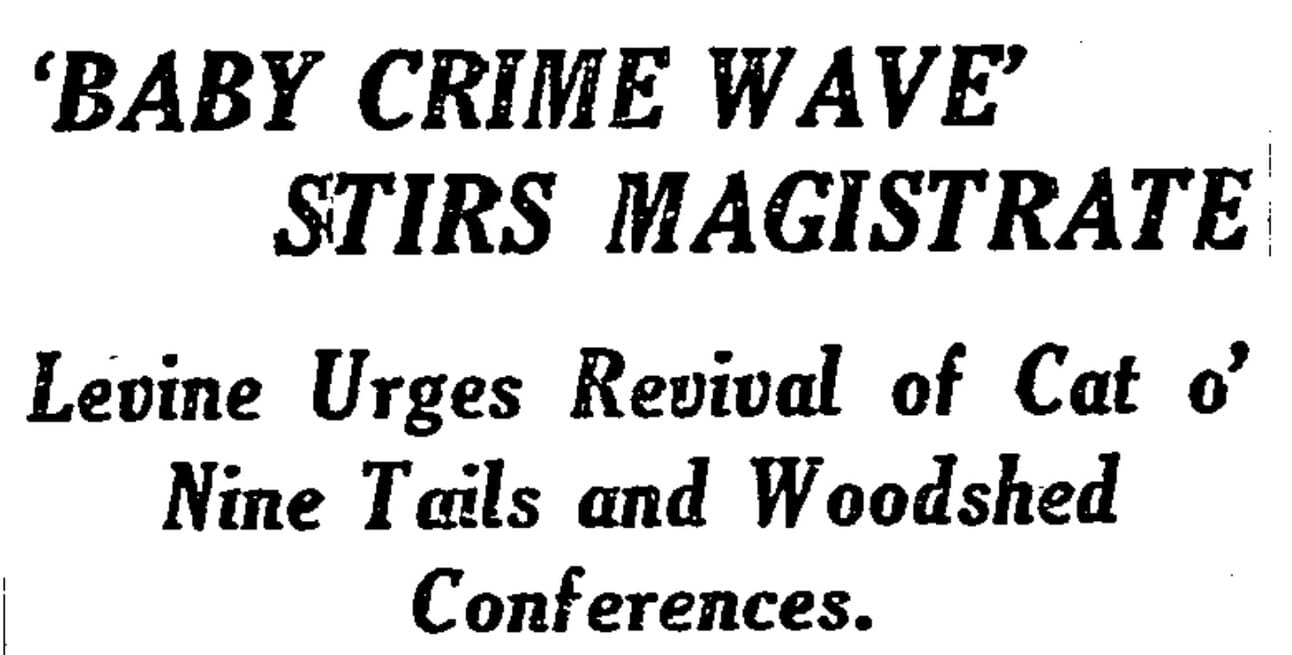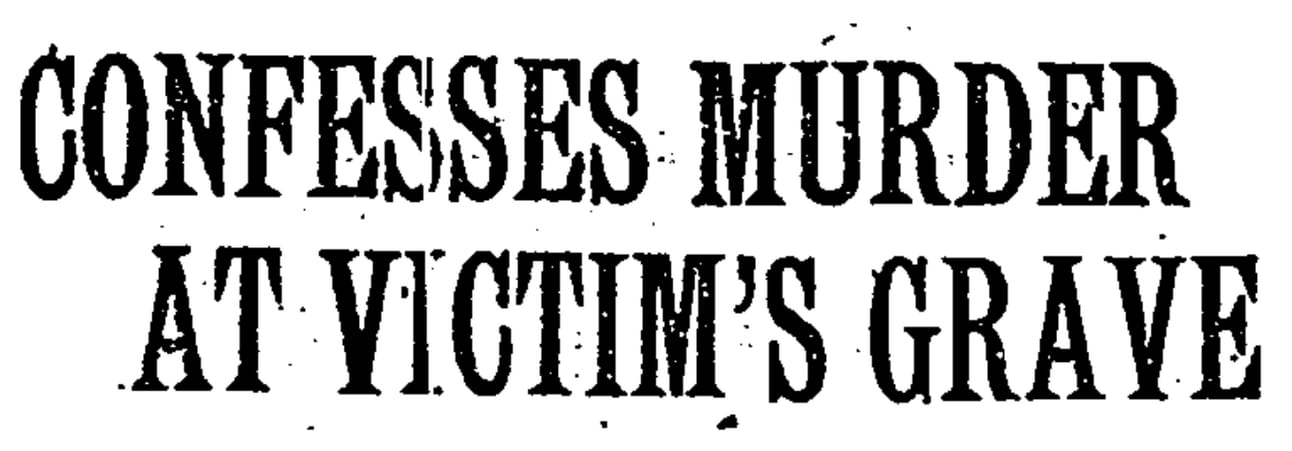- Strange Times
- Posts
- Strange Times 171: Baby Crime Wave
Strange Times 171: Baby Crime Wave

Behind on your Strange Pulp? Have no fear! Stories as spectacular as “World’s Youngest Wine Critic” never spoil. Read it today.
Today brings crime! Crime for babies and crime for grown ups as well. Blame everything on the mothers on…
June 20, 1921
After their automobile is involved in two accidents on the way to an Italian wedding, the guests choose to walk the rest of the way to the church.
Mannequins displaying English dress styles—including “daringly low-cut corsages” and “enormous plumed hats”—are booed by French racing fans at Auteuil.
Claiming that the Virgin Mary instructed him to murder his wife, a New York policeman shoots his wife but fails to kill her, then turns himself in to his colleagues for arrest.
In McCormick, South Carolina, a mob of 2000 white people force Herbert Quarles, a Black man accused of rape, to climb a tree before shooting him to death. The Times refers to this as “an uncommon way” of lynching.
The Weather: Generally fair today and tomorrow; not much change in temperature.

A return of one of my favorite genres of 1921 news: Judge Scolds Children! Classic examples of the form will be found in Issue 82, “You Are the Worst Boy,” Issue 79, “Stop Eating Candy,” and Issue 50, “He Must Wear Shoes.” Magistrate Levine takes things a step farther today, blaming the whole mess on the children’s mothers and their gabbing. What a jerk.
Eleven-year-old Michael Friedman, 13-year-old Abe Sponder and 16-year-old Sidney Siegel were arraigned before Magistrate Levine in the Morrisania Court yesterday afternoon on the charge of snatching a pocketbook containing $31 from Mrs. Amelia Bloch of 783 Beck Street, the Bronx. Commenting on the large number of crimes by minors in the past few weeks, Magistrate Levine lectured mothers for not disciplining their children.
“This looks like another one of those ‘baby’ crimes,” he said. “During the past fortnight my attention has been called to what appears to be a full-grown baby crime wave in the Bronx. I don’t know the cause, but it seems to me that it is time for a revival of the cat o’ nine tails and strenuous sessions in the woodshed.
“I think the mothers are most to blame. The fathers of families are too busy making a living for them, while too often the mothers stand around gabbing and gossiping in the streets. I blame the yellow movies for a good deal of the trouble, and now that the vacation season is here it will be worse than ever.
“I was raised on the east side, and while there has been a good deal of trouble there, it has heretofore been caused chiefly by full-grown men. Children there are raised with some care, as is evidenced by the fact that they are growing up to be successful men and women and good citizens. Most of them are a credit to the community.
“This wave of baby crime in the bronx has simply got to be stopped. I advise the women to pay more attention to their duties and responsibilities and do less gabbing.”

Incredibly dramatic stuff here. I didn’t realize it was the custom of the French police to confront suspects with open graves. In this case it worked, but when it didn’t you have to imagine the police ended up feeling pretty foolish for going through the whole rigamarole. In any case, this has inspired me to go get some Inspector Maigret.
PARIS, June 19.—Driven to confession by the sight of his victim’s body buried in a garden last November, Achille Dagubert, the proprietor of a garage near Bolougne, admitted yesterday that he had murdered a young Englishman, William Gourlay, and had robbed the corpse of 15,000 francs. The dramatic scene beside the hastily dug grave among the vegetables was the climax of a long inquiry carried on by the police and marked a triumph of French methods of criminal investigation.
When Gourlay disappeared in November suspicion fell on Dagubert, with whom it was known that he had been negotiating the sale of a car and in whose company he was last seen alive. Dagubert, indeed, admitted that he had bought the Englishman’s car, but said that Gourlay had met three of his countrymen in a touring car and had gone away with them.
Unable to disprove the story, but unsatisfied, the police kept a close watch on Dagubert. The latter outwardly lived an exemplary life and attended mass each Sunday with his fiancée; but it was discovered that he was spending a good deal of money in drinking bouts at home. The members of the family were shunned by their neighbors, even Dagubert’s paralyzed father being charged with having aided his son to burn the Englishman’s body in a furnace.
A few days ago Dagubert was arrested on a minor charge and taken to Boulogne. Meanwhile the police went over his premises carefully, ostensibly searching for stolen tires which he was alleged to have received. By a process of elimination they decided that the garden was the only place where a body could be concealed, and, sure enough, they found Gourlay’s corpse buried under the cabbages.
Then came into play the most terrible feature of French criminal procedure—the confronting by the investigating magistrate of the suspect with the body of his victim. At dawn, without warning, Dagubert was taken from his cell in a car to his own home. As the car drew up before the garage, he went as white as chalk and gasped: “Why are you bringing me here?”
“You will soon know,” replied the Magistrate and the policeman dragged Dagubert to the long hole in the ground. He dared not face the ghastly sight. Almost fainting, he muttered: “I confess that I killed him,” and told how, after having paid Gourlay, he had shot him in the back of the head with a Browning pistol and hid his body in an unused room.
Two mornings later Dagubert’s sister, a pretty girl of 17, found him digging in the garden. Jokingly she cried: “Well, what have you done with Gourlay? I hope you’ve not killed him.” To her horror, her brother confessed that in her joke she had stumbled on the truth. For the sake of her family, the girl says, she kept the secret, but urged her brother to leave the country. He thought that suspicion would be best avoided by staying quietly at home.
Despite the hostility of the local population, it is unlikely that the sister will be arrested on a charge of complicity in the crime. Family solidarity in France is so strong that her conduct is considered natural enough.




